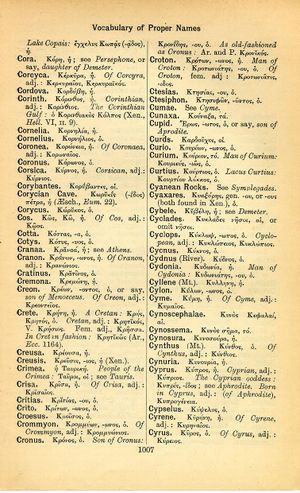Crito
γλῶσσα μὲν ἀνόστεος, ὀστέα δὲ θλάττει → angry words are bullets, many words hurt more than swords, one can kill with a word, one can kill with words, pen is mightier than the sword, the pen is mightier than the sword, tongue is not steel, tongue is sharper than any sword, tongue wounds more than a lance, word can hurt, word can kill, words are bullets, words are the greatest weapon, words are the new weapons, words are weapons, words can hurt, words can hurt more than swords, words can kill, words cut deeper than a knife, words cut deeper than any sword
English > Greek (Woodhouse)
Κρίτων, -ωνος, ὁ.
Latin > English (Lewis & Short)
Crīto: ōnis, m., = Κρίτων,
I a rich citizen of Athens, a disciple and friend of Socrates, Cic. Tusc. 1, 43, 103 al.—
II A Grecian physician of Trajan's time, Mart. 11, 60, 6.
Latin > French (Gaffiot 2016)
Crĭtō, ōnis, m. (Κρίτων), Criton [disciple de Socrate] : Cic. Tusc. 1, 103 || personnage de comédie : Ter. Andr. 801.
Latin > German (Georges)
Crito, ōnis, m. (Κρίτων), I) Schüler u. Freund des Sokrates, Cic. Tusc. 1, 103. – II) griech. Arzt zu Trajans Zeit, Mart. 11, 60, 6.

